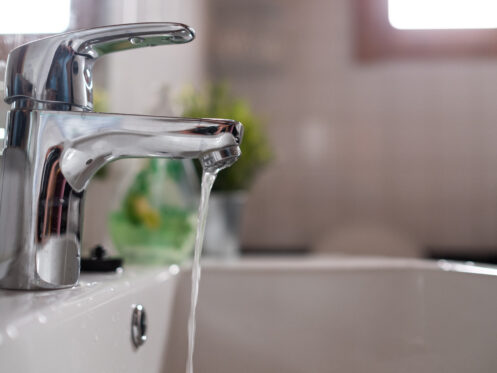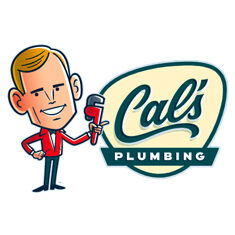Water pressure is an essential concept every homeowner should understand, as it directly impacts the functionality and comfort of your home. Imagine starting your day with a surprisingly weak shower or struggling to clean your dishes due to inadequate water pressure. Understanding the science of water pressure can prevent such cases, and one’s house will remain protected from plumbing damage. This guide will highlight the fundamentals of water pressure, how it is determined, factors that influence it, and ways to have consistent water pressure at your home. Let’s equip you with the knowledge to tackle water pressure issues and ensure a constant supply.
What Is Water Pressure?
Water pressure is the actual pressure with which water enters your pipes. The amount of water flowing through your shower or faucet depends on water pressure. Water pressure is measured in pounds per square inch (psi); preferably, water pressure should be between 40 and 60 psi for most homes. Water pressure may vary due to the height of your residence, the size of your service line, and the number of people who need water consumption within the vicinity. Water pressure that is too low can result in frustratingly slow water flow, while pressure that is too high can damage your plumbing system.
How Is Water Pressure Measured?
The instrument used for measuring water pressure is called a water pressure gauge. It is a straightforward but helpful device connected to an outdoor faucet or a washbasin inlet, such as that on a washing machine. Upon switching on, the gauge displays the pressure supplied from your home’s pipes in pounds per square inch or psi. To obtain an accurate result while measuring water pressure, it’s necessary to ensure water isn’t being used anywhere else in the house. To get a precise reading, turn off every tap, shower, washing machine, and dishwasher.
Factors Affecting Water Pressure
Elevation is a factor affecting water pressure. Water must work against gravity to reach higher points, so homes on hills or higher floors of buildings often experience lower water pressure. Similarly, the size and condition of your service lines play a critical role. Older homes with smaller or corroded pipes may display reduced water pressure. Furthermore, the demand for water in your area can cause variations in water pressure. If many people use water simultaneously, such as during peak morning or evening periods, your water pressure might drop temporarily.
Another critical factor is the water valve. If the main water valve is not fully open, it can restrict water flow and decrease pressure. It’s essential to ensure that this valve, typically located near the water meter, is entirely open.
Finally, leaks within your plumbing system can also cause low water pressure. Leaks suggest that if water is escaping from your system, it reduces the quantity of water that can flow to your taps and appliances. Inspection and maintenance of the plumbing system should be done regularly so that any leaks are identified before they start giving you low or inconsistent water pressure in your house.
Maintaining Optimal Water Pressure
Maintaining optimal water pressure is crucial for the smooth operation of everyday household tasks and the overall longevity of your plumbing system. This involves proactive tracking to flag potential issues before they become critical.
First, you must buy a good quality water pressure gauge and regularly monitor your water pressure. This will also track any significant decline or a constant drop, implying serious complications.
Secondly, regular inspections of your home’s plumbing system, including the pipes and valves, are also essential. Ideally, this should involve a professional plumber who can detect corrosion, leaks, or water pressure blockages. In addition, the professional may suggest changes such as upgrading or fixing plumbing components for enhanced water pressure in older homes with antiquated systems.
Living at a high-altitude place or on the upper stories of a multistory building may necessitate using water pressure boosters as an alternative. These tools increase the force with which the water enters your house, compensating for the effects of gravity.
Talk to your local water company if the low pressure is consistent. They can offer valuable details regarding the water pressure in your area and possible problems that could be causing this issue. Remember, proper knowledge and timely action can help preserve optimal water pressure, ensuring a comfortable and efficient water supply in your home.
Types of Water Pressure Problems
While low water pressure is a common problem, high water pressure can also be an issue. High water pressure may compromise your plumbing system, leading to burst pipes or leakage. High water pressure could also result in water waste and high utility bills. Understanding the potential problems caused by low or high water pressure can help you take preventative measures.
Because the water flows so slowly, low water pressure makes even simple daily chores like taking a shower or doing the dishes annoying. Likewise, it may cause extended cycles on washing machines and dishwashers while yielding reduced cleaning effectiveness.
However, too much pressure may allow a surge or burst of water that ruptures plumbing pipes, resulting in cracks and leaks. In addition, it might strain your appliances and reduce their durability. Consequently, you’ll have to repair them more often or even replace them.
Solutions to Water Pressure Problems
The solution to water pressure problems depends on the type of issue you’re experiencing. For low water pressure, some simple fixes include cleaning or replacing clogged aerators and showerheads, adjusting your main water valve to a more open position, or repairing any leaks in your plumbing system.
Installing a pressure-reducing valve (PRV) for high water pressure can help regulate the water flow entering your home. These devices can be installed by a professional plumber and are designed to reduce the stress of incoming water, protecting your plumbing system and appliances from damage.
Replacing old or corroded pipes may also be necessary to address low water pressure issues. Consult a trusted plumber for expert advice on the best course of action for your situation. For Tucson, AZ residents, Cal’s Plumbing provides professional plumbing services.
Proper water pressure regulation in a house ensures comfort and extended pipe life. Knowing what might lead to reducing water pressure and constantly checking for such things can provide a better, more comfortable water flow in your home. Always seek the advice of a qualified plumber whenever you need to make significant adjustments or repairs to your plumbing system. Ensure you constantly watch out for problems to stay ahead in water pressure management. With the proper knowledge and proactive approach, you can save yourself from the frustrations and expenses associated with water pressure problems.
For all your plumbing needs, trust the expertise of Cal’s Plumbing. We serve the Tucson, AZ, community. We provide a comprehensive range of services, including plumbing, drains, water heater services, and water treatment. Don’t let water pressure issues frustrate you any longer. Use the knowledge gained today and contact us to schedule an inspection or correction of your water pressure.





